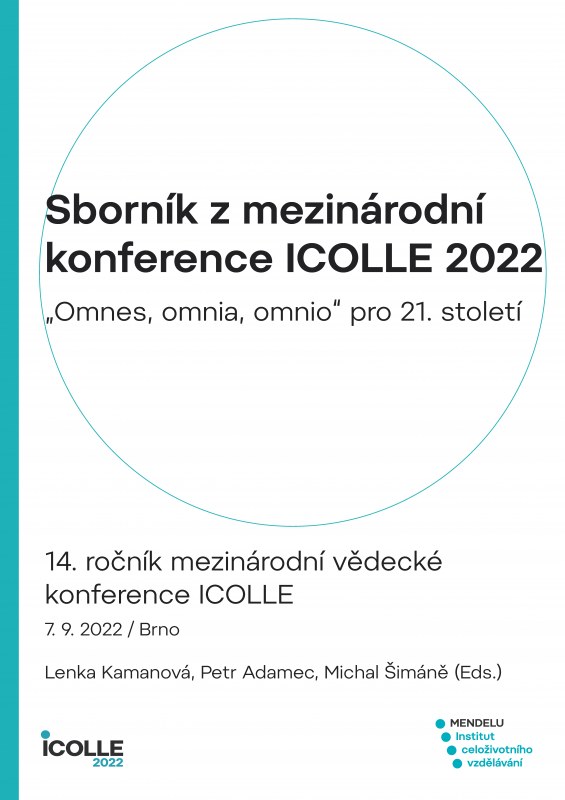
DOI: 10.11118/978-80-7509-922-8-0090
INTEGRITA MORÁLNEHO A KRITICKÉHO MYSLENIA V PREGRADUÁLNEJ PRÍPRAVE V ODBORE UČITEĽSTVO
- Martina Kosturková
Intellectual virtues are very important skills of a future teacher. They play an important role in cultivating a character and stimulating the critical thinking of the educator. They are reflected mainly in the constitutive function of the virtue of reason - phronesis as a practical wisdom that helps one to identify two incompatible goals, namely egocentricity and consideration. It is just intellectual rationality (trust in reason) that is required for us to develop a network of interconnected virtues – both intellectual and moral, in which critical and moral thinking is integrated. The aim of the study is to present the integrity between moral reasoning and critical thinking in teacher students – through intellectual virtues. We used the methodology of Paul (1992) to measure intellectual virtues. The tool consists of 35 strategies that quantifying the extent to which the respondent identifies with them. The first nine strategies form the affective area (intellectual virtues). The students’ task was to evaluate the level of development of individual strategies on a scale ranging from 1 (positive assessment) to 7 (negative evaluation). The available selection consisted of N = 241 students in their 2rd and 3rd year on bachelor’s teaching programmes at Prešov University in Prešov –Slovak Republic. The data were collected in the academic year 2020/2021 at the University of Prešov. The conclusions of the research lead to a necessary change in academic training concerning the development of intellectual virtues. Although the university is at the crossroads of the influence of family education and the education of primary and secondary schools, university students come into contact with some components (e.g. strategies for the development of intellectual virtues) for the first time, which is very late. Our effort is to support the supporting components of critical and moral thinking to such an extent that they become a part of the autonomous profile of the beginning teacher.
Keywords: reasonableness, intellectual virtues, critical and moral thinking, common standards of thinking, a model of the integrity of moral and critical thinking
pages: 90-97, online: 2023
References
- Akvinský, T. (2021). Summa Teologická. Prel. Machula [online]. Dostupné na: http://areopag.sk/thomas/SummaTheologica.html [cit. 2020-11-28]:
- Aristoteles. (2021). Etika Níkomachova. Prel. A Kříž. Praha: Rezek.
- Čavojová, V. & Jurkovič, M. (2017). Výskum racionality a rozhodovania na slovenských učiteľoch s rôznou úrovňou profesionálnej skúsenosti. In: Halama, P. (Ed.). Rozhodovanie profesionálov. Procesuálne, osobnostné a sociálne aspekty. Bratislava: Ústav experimentálnej psychológie SAV, s. 80-95.
- Gardner, H. (2009). 5 Minds for the Future. Boston: Harvard Business School Press.
- Hanák, R., Čavojová, V. & Ballová Mikušková, E. (2014). Educating rationality: assessing master rationality motive in future teachers. In: INTED 2014 Publication. Valencia: IATED, p. 6458-6463.
- Huitt, W. (1988). Personality differences between Navajo and non-Indian college students: Implications for instruction. Equity & Excellence, 24(1), 71-74.
 Go to original source...
Go to original source... - Chao, S. Y. et al. (2003). Identifying Critical Thinking Indicators and Critical Thinker Attributes in Nursing Practice. Journal of Nursing Research, 21(3), 204-210.
 Go to original source...
Go to original source... - Klooster, D. (2000). Co je kritické myšlení? Kritické listy: občasník pro kritické myšlení [online].. Praha: Kritické myšlení. Dostupné na: https://adoc.pub/co-je-kriticke-myleni.html [cit. 2020-10-16].
- Knapík, J. (2020a). Hodnotová orientácia študentov vysokých škôl. Verbum: Katolícka univerzita v Ružomberku.
- Knapík, J. (2020b). The moral value orientations of university students. Ad Alta, 10(1), 128-131.
- Kosturková, M. (2022). Integrita kritického a morálneho myslenia v problematike cností a vo výskume. Prešov: Rokus.
- MacIntyre, A. (1981). After Virtue. A Study in Moral Theory. Notre Dame [Indiana]: University of Notre Dame Press.
- Paul, R. W. (1992). Critical Thinking: what Every Person Needs to Survive in a Rapidly Changing World. Rohnert Park CA: Foundation for Critical Thinking.
 Go to original source...
Go to original source... - Paul, R. W. (2020). Critical Thinking, Moral Integrity and Citizenship. Thomales [CA]: Foundation for Critical Thinking. [online]. Dostupné na: http://www.criticalthinking.org/pages/criticalthinking-moral-integrity-and-citizenship-teaching-for-the-intellectual-virtues/487 [cit. 2022-08-20].
- Paul, R. W. & Elder, L. (2001). Critical thinking: Tools for talking charge of your learning and your life. Upper Saddle River, NJ: Prentice Hall.
- Paul, R. W. & Elder, L. (2006). The Thinker's Guide to Understanding the Foundations of Ethical Reasoning. Dillon Beach [CA]: Foundation for Critical Thinking.
- Paul, R. W. & Elder, L. (2013). The Thinker's Guide to Ethical Reasoning. New York: Rowman & Littlefield.
- Pavlovkin, K. (2019). K otázke rozlíšenia intelektuálnych a mravných cností u Aristotela a Tomáša Akvinského a ich významu pre súčasnosť. Filozofia, 74(3), 181-193.
 Go to original source...
Go to original source... - Petrasová, A. (2021). Kritické myslenie a učenie sa v súvislostiach. Prešov: Prešovská univerzita v Prešove.
- Ruisel, I. (2018). Múdrosť a hlúposť. Bratislava: Ústav experimentálnej psychológie, Centrum společenských a psychologických vied SAV.
- Rusnáková, N. & Kučerková, M. (2021). Reading Literacy in the Foreign Language. The Key Position of the Input Text and its Selection. In: Proceedings of INTED2021 Conference, pp. 8762-8767.
 Go to original source...
Go to original source... - Šuťáková, V., Ferencová, J. & Ištvan, I. (2019). Škola v procese zmeny. Prešov: Fakulta humanitních a prírodných vied.


